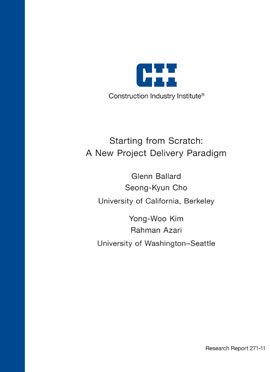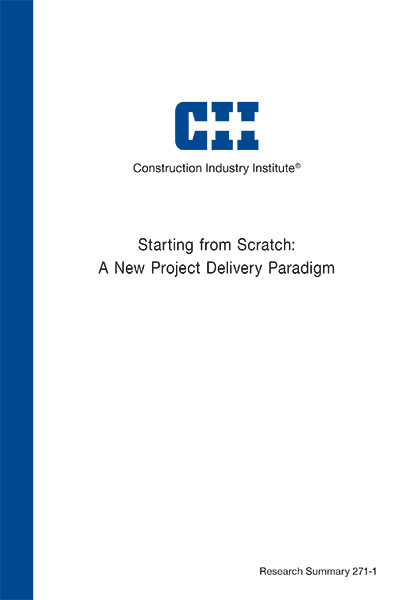
Starting from Scratch: A New Project Delivery Paradigm
RT271 was challenged to rethink the capital project delivery system. We tried to dream how the system could be different than it is, at both the industry and project levels. While developing dreams into testable hypotheses, we were struck how easy it was for a group of diverse industry practitioners and academic researchers to agree on an ideal project delivery system. That raised the question why then wasn’t everyone working to create it?
We found an explanation in the theory of paradigms, which says that the way we think and behave is driven by fundamental presuppositions about the world. Thomas Kuhn (Kuhn, 1996) revealed how scientific knowledge progresses. Far from the methodical accumulation of knowledge previously understood, science moves through periods of revolutionary upheaval, in which fundamental presuppositions and conceptualizations change. An example of such a paradigm shift is the change to seeing the sun as opposed to the earth in the center of the universe. As a historian of science, Kuhn documented the process of paradigm shift, noting the difficulties opposing camps had in even talking with one another. Rational discussion requires shared presuppositions. When presuppositions are radically different, rational discussion gives way to battles—sometimes physical battles, but in the case of scientific disputes, more often battles in which experiments are the weapons of choice.
When experiments yield anomalistic results, they reveal underlying presuppositions and cause some people to question those paradigms. On the other side of the battle, those who have spent their careers believing in certain paradigms may never be able to “get their head around” new ways of thinking and acting. Kuhn tells sad stories about able, intelligent scientists who were never able to embrace the new theory of combustion.
RT271 came to think that realization of the ideal project delivery system is best understood as a clash of paradigms. What paradigms underlie and inform current thinking and practice in construction project management? Here are a few:
- Trust is for suckers.
- Win-win is an illusion. What counts is that I win.
- You can manage projects by managing contracts.
- Risk is managed when transferred to someone else.
- If you pay least price for each part of a project, you pay least price for the project.
- Management by results yields the best results.
- Variation in work flow is from external causes.
- Resource utilization trumps project flow.
- Control starts with identifying a negative variance between DID and SHOULD.
- Social factors are interesting, but don’t really matter.
Such paradigms may be understood as “common sense,” or the “no-nonsense” way of viewing the world realistically and pragmatically. But in fact, they are obstacles to a much better world—a world in which the construction industry is known for challenging and developing people, in which personal relationships not only survive projects but thrive in them, in which continuous improvement is a fact of life. The ideal capital project delivery system we developed provides the following benefits:
- Aligns the interests of the parties with the interests of the customer(s)
- Integrates organizationally, engaging downstream players in upstream work and vice-versa
- Places management attention on enabling successful performance, as opposed to enforcing compliance to overly detailed prescriptions how to achieve desired objectives.
“Capital project delivery system” can also be understood as referring to the construction industry itself; its structure, its capabilities, its ways of working. In our dreaming about the construction industry as a whole, we see a system that is self-conscious and self-directing, causing its own future—an industry which breaks free from the unproductive and wasteful oscillation between buyers’ market/sellers’ market and lives the dream of continuous improvement. This dream would have the industry collectively shape the context in which individual project delivery systems are designed, rather than simply react to what is given.


